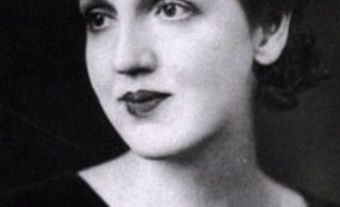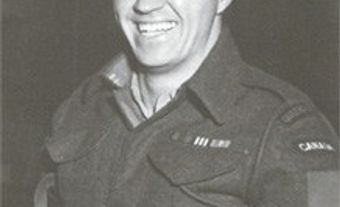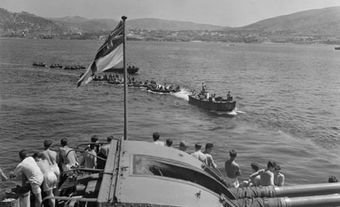This article was originally published in Maclean's Magazine on October 13, 2003
Canadian Troops Killed in Afghanistan
The road they died on could hardly even be called one. Maj.-Gen. Andrew Leslie, the top-ranking officer of the Canadian task force in Kabul, said it was really more of a "sandy track" that his troops were patrolling in the hills just outside Afghanistan's capital when their jeep-like Iltis vehicle was blown up by what appears to have been a powerful LAND MINE. "Bad-guy country," Leslie laconically called the area where it happened - and there can be little doubt about that assessment. Two soldiers from the Royal Canadian Regiment, 3rd Battalion, Sgt. Robert Short of Fredericton and Cpl. Robbie Beerenfenger of Ottawa, were killed by the blast, and three more injured, fulfilling the many warnings that the unusually large commitment Canada has made to helping rebuild Afghanistan carries with it grave dangers.
But there will be no cutting and running. "The Taliban and al-Qaeda want us to retreat to our camps or run away," Leslie said. "And neither, of course, is an option for our soldiers." The imperative to stay put, though, goes well beyond a soldier's honour. To federal politicians and foreign-policy mandarins, Afghanistan represents much more than an isolated PEACEKEEPING mission. The Canadian contingent of about 1,900 is the second largest of the 31 countries represented in the 5,500-strong NATO-led International Security Assistance Force based in Kabul. It represents by far Canada's most conspicuous contribution to the U.S. "war on terror" - and Ottawa's main calling card when it comes to rebuilding credibility with Washington after sitting out the invasion of Iraq.
And beyond its importance in healing Canada's frayed relations with its biggest ally, Afghanistan is serving as a sort of foreign-policy laboratory. In the post-Sept. 11, post-Iraq war world, the problem of carving out a role for Canada might be summed up this way. We want to play our part, in particular helping the U.S. combat terrorism - but not at the beck and call of George W. Bush. We're proud of our military history and take satisfaction when our troops are deployed abroad - but preferably for peacekeeping rather than actual fighting. We aim to leverage our modest clout on the world stage by acting through multilateral bodies - but worry that the UN might be too weakened, after the bitter divisions on its Security Council over the Iraq war, to be a reliable vehicle for our international aspirations.
In Afghanistan, solutions to all these dilemmas are already being translated into action - at least in theory. Just run down the checklist. Avoiding too much direct U.S. control? In Afghanistan, Canada is expected take full command of the NATO stabilization force next year. Showing a serious military side without going to war? In Afghanistan, Canadian troops get to be nation-builders, not regime-changers. Getting around the UN's limitations without abandoning a multilateral approach? In Afghanistan, NATO is proving - as it did in the former Yugoslavia - to be a workable alternative to the traditional blue-bereted UN peacekeeping mission.
That's a lot of geopolitical baggage to load on the backs of the Canadian troops stationed mostly at dusty Camp Julien on the outskirts of Kabul. To those men and women in uniform on this distant mission, some of whom are profiled on the following pages, the job is more straightforward: keep the peace in and around the capital as the embryonic Afghan regime strives to restore nation-state authority over its territory. Canada's commitment is to stay until next August. What's more, Canada is backing up its military presence by funnelling $250 million in aid into the country, enough to boast that it currently ranks as the largest donor to Afghanistan. And a rudimentary embassy has been set up in Kabul, despite conditions that few ambassadors have even imagined.
Canada agreed to play a big part in the Afghanistan stabilization force in early February, during the tense buildup to the U.S. and British invasion of Iraq. The key component from the outset is the soldiers, who are now mourning their first casualties since arriving to join the NATO stabilization effort in August. But Ottawa's catch phrase for the approach is "Three-D" - defence, but also development and diplomacy. It's a far cry from the classic peacekeeping formula: patrol a line between two warring sides after they agree to stop shooting. For one thing, in Afghanistan there are many more than two sides. For another, beyond the problem of taming the factions of local warlords, tenacious Taliban, and perhaps remnants of al-Qaeda, Afghanistan is just plain poor - desperately so. "What's required is actually getting in and helping rebuild the society," Foreign Minister Bill Graham told Maclean's. "In Afghanistan, we have a co-operative effort between defence, foreign affairs and the Canadian International Development Agency."
Of the three Ds, though, defence needed to be in place first to provide essential security for those delivering development aid or engaging in diplomacy. The UN just wasn't capable of getting enough soldiers on the ground fast enough to deal with failed-state chaos on the scale of Afghanistan's. Enter the North Atlantic Treaty Organization. Back in the early 1990s, after the collapse of the Soviet Union, NATO looked headed for obsolescence. Instead, its interventions in Bosnia and Kosovo showed a potential new role. In Afghanistan - an awfully long way from the North Atlantic - the old Cold War alliance is showing even greater adaptability. Graham calls it a "new model," but stresses that NATO is acting with UN approval in Afghanistan. "NATO has a capacity to pull together peacekeeping operations and quickly provide the basic underpinnings of an operation of this size in a way the UN lacks," he says.
But if the basic elements of a new sort of nation-building seem to be coming together in Afghanistan, success is far from assured. In fact, the sheer ungovernability of the country may make a mockery of upbeat slogans like Three-D - suggesting possible alternatives like defeat, despair and, eventually, departure. That's what Afghanistan forced on the Russians and, before them, the British. "There is a long history of interventions that have tried to stabilize Afghanistan," says Fen Hampson, director of the Norman Paterson School of International Affairs at Carleton University in Ottawa. "And that history is one of repeated failures, followed by the withdrawal of forces."
Hampson points to the absence of "rudimentary elements of civil society" inside Afghanistan, and, along its borders, unhelpful neighbours, like Pakistan and Iran, willing to exploit its instability. So far, he says, there is no sign of a big enough Western commitment of military might and economic aid to overcome those daunting obstacles.
As Canadian soldiers got back to patrolling Afghanistan's lawless roads last week, they had more immediate worries than the country's doleful history and messy regional politics. Trying to avoid mines is one of their main concerns. "Afghanistan is littered with mines and explosive devices buried in the ground," said Leslie. "A variety of of estimates range from nine to 11 million, making Afghanistan arguably the most heavily mined area in the world." Initially, there was speculation the aging, lightly armoured Iltis that the Canadians were riding in when they hit the explosive left them particularly vulnerable. But Leslie said even a newer, better armoured light vehicle likely wouldn't have offered enough protection against such a powerful blast.
Yet last week's tragedy for Canada does not approach the steady number of deaths Americans are being asked to accept in Iraq. Nearly six months after they marched into Baghdad, American forces in Iraq are suffering three to six deaths per week. Still, according to John Norris, a Washington-based special adviser to the Bush administration who works for the independent International Crisis Group, there remains "broad understanding across the U.S. political spectrum" that America can't afford to exit Iraq in failure.
As for Afghanistan, Norris sees signs of a similar resolve to succeed in a proposal from Germany for NATO's presence to be extended beyond Kabul. "The lack of a more robust NATO peacekeeping presence outside Kabul has left a vacuum," he said, "which local warlords have exploited and the Taliban has used to reorganize in some parts of the country." The idea of widening stabilization force operations was expected to be discussed this week when NATO defence ministers meet in Colorado Springs. Canada, though, is unlikely to be able to contribute much more: the current commitment is already straining the Canadian Forces' limited capacity. If Afghanistan represents a new sort of nation-building intervention, then the intervening countries will need extraordinary staying power to make the model work. From the troops on the ground, as last week's tragedy showed, what's needed is all that, and bravery too.
One soldier's e-mail from Kabul - and from the heart: "I want Canada to remember that we are here"
In the wake of last week's deaths, Cpl. Christian Elia, who is serving in Afghanistan, sent this e-mail to a friend in Canada. He gave Maclean's permission to publish this excerpt:
The two soldiers who died today were my friends. Sgt. Rob Short, 42, was a fellow paratrooper of exceptional quality - a member of a brotherhood that I cannot explain to the uninitiated. The other, Cpl. Rob Beerenfenger, 29, was a soldier of extreme competence and skill. Short was the first man to greet me when I got off the bus from battle school, and he remained an example of what all paratroopers should be. He always made you feel good about yourself and your job. A master sniper, with almost 20 years in the army, he was a constant example of what inner strength and solid determination could produce. Even on a bad day he could have killed a dozen of the bastards who laid the mine that killed them.
Beerenfenger was quiet, awesome at his job. The last time I pulled a shift with him, all he could talk about were his kids and how he was going to finally be able to give them what they deserved for Christmas with his tour money. He was so proud. The people that I want your prayers to be directed to are their families and the four men who were with them that day. What they witnessed they will never truly forget, and they deserve your thoughts and prayers. I want Canada to remember that we are here, dying, protecting Kabul in the name of freedom - something we all take for granted back home. Canada rocks, and these men rocked the house. Let's remember that. God be with us in these tough times.
Maclean's October 13, 2003

 Share on Facebook
Share on Facebook Share on X
Share on X Share by Email
Share by Email Share on Google Classroom
Share on Google Classroom


